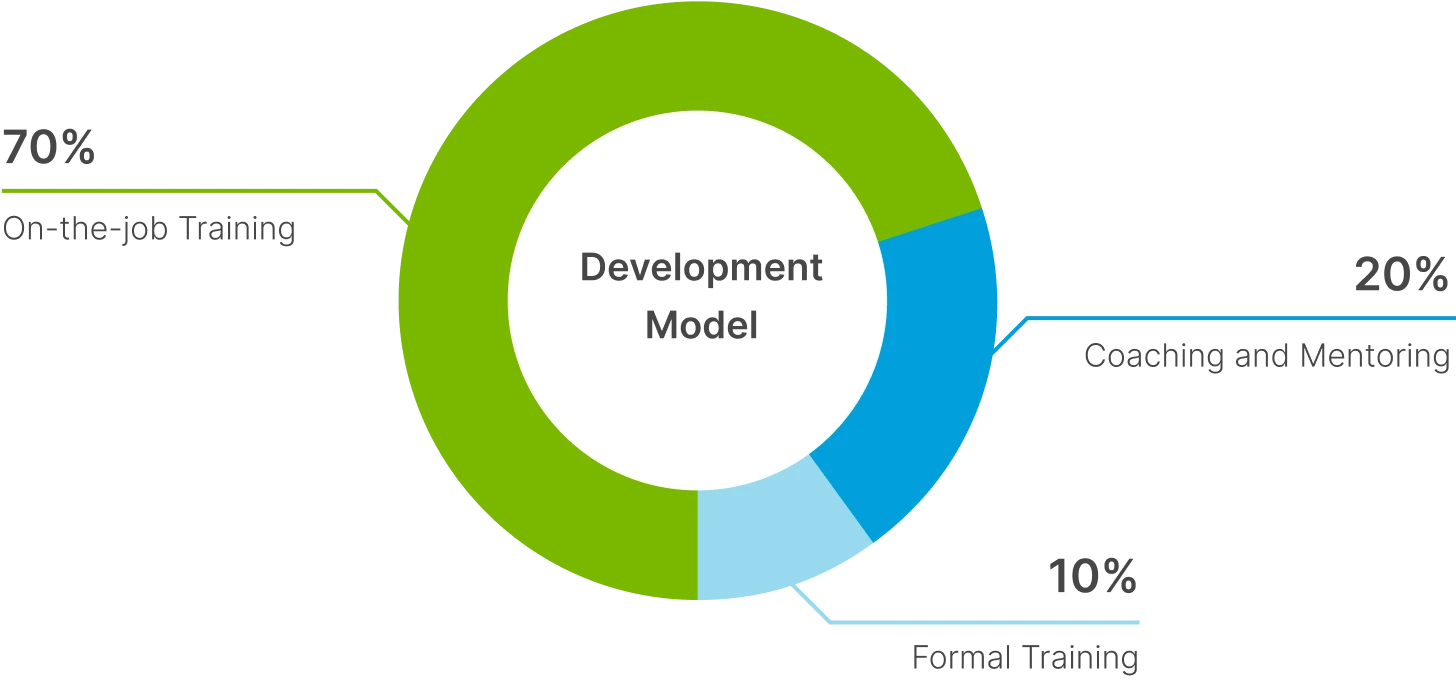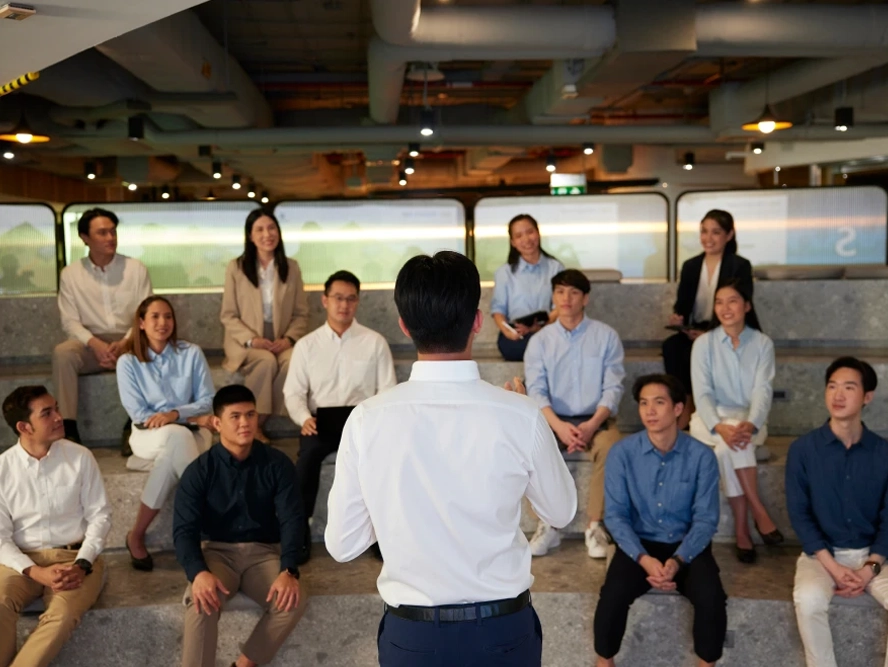

Human Resource Management
Importance and Mission
As employees are key stakeholders who play a crucial role in driving towards sustainability goals, in line with our vision to be the “Energy Partner of Choice” and create sustainable value for all stakeholders, PTTEP strived to:
- Create a positive work environment and ensuring equal treatment for all employees.
- Support employees in developing their potential, advancing their careers, and demonstrating their engagement.
- Empower employees to showcase their full capabilities while maintaining continuous motivation.
- Uphold the EP SPIRIT corporate values to strengthen collaboration across all levels of the organization.
Goals
Under the Energy Partner of Choice vision, PTTEP puts importance on human resource management, a vital resource in our business operations and a key mechanism in propelling organizational transformation. The Company aimed to:
- Put great efforts to prepare people readiness in alignment with PTTEP business direction towards energy transition and ongoing changes.
- Focus on succession planning, especially in success profiles development, the execution of succession plan in all PTTEP business areas; Exploration and Production (E&P), High Value Projects and beyond E&P.
- Continuously develop and upskill employees in technical and non-technical areas, including future skills, digital skills, soft skills, and mindset, to ensure readiness for transition to new business areas, including Beyond E&P
- Leverage digital transformation in work processes for efficiency improvement.
- Support a Hybrid Workplace model, combining office work and remote work (Work from Anywhere), enabling employees to manage work-life balance effectively.
PTTEP believes that people readiness preparation is the key to support the Company to enhance our competitiveness for business environment and promote sustainability in the long-term, and contribute to our healthy and happy work environment as “The happiness of employee is the energy of organization”.
MANAGEMENT APPROACH
Human Capital Development
Human Capital Development Policy
To enhance the capability of the organization as well as its employees, both Thai and other nationalities, to serve business expansion in Thailand and abroad, PTTEP has implemented the competency-based training and development approach under the 70:20:10 development model (70% on-the-job training, 20% coaching and mentoring, 10% formal training). These strengthened approaches are aimed at speeding up their efficiency.

Development programs are as follows:
In-House and External Training
The Company provides online and classroom training for employees and executives at all levels and allows them to attend the training and seminars organized by domestic and international institutions to equip them with technical, functional, Safety, Security, Health and Environment (SSHE) knowledge, and necessary skills required to successfully perform the roles such as digital skills, foreign language skills, business administration and leadership competencies.
Long-term Training and Development Programs
The programs aim to ensure capability readiness of employees before taking full accountability on his/her assignments through on-the-job training programs within PTTEP, or at joint venture partners' or service providers' companies in Thailand and abroad. The programs run between 1-3 years in accordance with the employee's Individual Development Plans (IDPs).
Master's Degree and Doctoral Degree Scholarship Programs:
The Company provides scholarships to employees pursuing studies at leading Thai and overseas universities in the following fields:
- Petroleum Geosciences
- Petroleum Engineering
- Engineering
- Drilling and Well Engineering
- Technology and Carbon Solution
- Digital and Information Technology
Master's degree scholarships are also extended to Thai university students who study in the following fields without legal binding:
- Petroleum Geosciences (International Program), Chulalongkorn University
- Applied Geophysics (International Program), Chiang Mai University
Executive Capacity Development
PTTEP has outlined succession plan for all management positions which are critical positions to drive and ensure continual growth and sustainability of PTTEP business. The Career Review Board (CRB) Committee has the role and responsibility to screen and select successors for each management position against requirements in PTTEP Management Success Profile and the individuals' Currently Estimated Potential. Upon receiving the list of successors, the Company designs individual short-term and long-term development plans, emphasizing on improvement of their functional knowledge, managerial skills, personality, and behaviors as guided by corporate values and organizational culture. This is to ensure that the successors are qualified and ready to take the target positions in time. The executive capacity building programs are as follows:
1. Strong Leadership to Sustainable Organization
PTTEP has laid out succession plan and prepared talent pipeline for executive and managerial positions to ensure business continuity with an aim to secure each position with at least 2 identified successors. List of successors is reviewed on an annual basis to prevent possible impacts following executives' retirement or resignation and to support PTTEP business expansion. The potential successors as well as other high-potential employees will then participate in PTTEP Talent Management Program which consists of the following key activities in 2024.
1.1. EP LEAD Leadership Development Program comprises of EP LEAD I and EP LEAD II. The program, classified by level of participants, aims to equip a new generation of leaders with comprehensive business management capability, interpersonal skills and executive networking to enable them to strive and thrive while also provide them an opportunity to pursue their career goal. The program organized in 2024 was designed to provide an immersive experience for PTTEP leaders to learn and acquire skills to lead transformation in the new era.
1.2 Global Leadership Program aims to develop leaders to be ready for executive roles in the Company's international projects. The 2024 program is designed to provide participants with learning experiences through exchanges with experienced professionals, enhancing executives' confidence and readiness to represent the Company internationally. PTTEP recognizes mentorship as a powerful tool for leadership development, enabling leaders to enhance their competence and prepare for future growth. Through building relationships, exchanging perspectives, and sharing knowledge and experiences, mentors guide the professional and personal development of their mentees. Mentorship is also crucial for managing and transferring knowledge to the next generation. In 2024, PTTEP continued our Mentorship Program for executives and plans to sustain this program to support the Company's sustainable growth.
1.3 PTT Group Leadership Development Program (GLDP) and Government Agencies involves PTTEP nominating executives to attend Leadership Development Program (LDP) organized by PTT Leadership and Learning Institute and other government agencies' programs to establish internal and external networking and relationship regularly. To prepare PTTEP executives for career advancement, in 2024, selected participants attended the LDP I and LDP II Programs and also participated in government agency development programs.
Employee Capability Development
PTTEP gives highest priority to employees’ capability development to ensure that our employees are fully capable and can maximize their potential to drive performance to support business direction. In 2024, the Company has laid out the capability development focuses in 2 main areas:


- Capability Development for E&P Business To grow and sustain its core business in oil and gas exploration and production as well as achieving its EP Net Zero 2050 and Thailand greenhouse gas commitment, PTTEP has prepared the Capability Development Plan to develop its employees with multi-skills/multi-tasking capabilities using the T-Shape development model to enhance both technical and professional skills and necessary future skills such as digital literacy and data analytics. This aims to create more work efficiency and innovative solutions in the company.
- Capability Development for Beyond E&P Business To ensure capability readiness and accelerate the development of target employees to drive current and future new businesses beyond oil and gas exploration and production, PTTEP has prepared the Capability Development Plan to accelerate target employees’ capabilities to have dynamic capability for new businesses such as Carbon Capture, Utilization, and Storage (CCUS), Hydrogen, Renewable Energy, Future Technology as well as creating new business opportunities from in-house technology commercialization.
Additionally, PTTEP has embedded the New Normal culture into working environment for management and employees. We have brought and applied the Outwards Mindset concept to everyone which we believe that this will encourage our employees to be more open-minded and empathic, which is the foundation of innovation and entrepreneurship.
Organizational Capability Development
PTTEP has carried out online Key Performance Indicators (KPIs) assessment or Performance Development Appraisals (PDAs) on an annual basis. All employees and executives are evaluated based on the schedules and methods set by the Company. Since 2010, the annual evaluation on employee skills has been exercised through the Company's Intelligent Competency Management System (iCMS), a web-based system. The skill evaluation varies according to each employee's Job Competency Profile (JCP), to determine if they have the right skills for their assignments. Results are used in improving Individual Competency Development Plans (ICDPs) which are based on the 70:20:10 development model. To address the organization's needs, development plans will be guided chiefly by the Company's business strategies. Overall, the system involves two formal performance review sessions: mid-year review and year-end appraisal. Behinds that, employees also receive ongoing performance appraisal through regular check-ins 3 times throughout the year with their supervisors on professional development.
PTTEP's Performance Management System (PMS) also includes team-based performance appraisal where an individual's performance is assessed through the divisional, departmental, and N+1 KPI. In addition, the 360-degree evaluation system is also exercised to be used to evaluate employee behaviors in response to the EP SPIRIT corporate values.
This evaluation allows the evaluated a comprehensive view on themselves and where self-improvement should start. The evaluation criteria and content has been reviewed for clarity and to reflect the current level of EP SPIRIT and behaviors that will drive organizational change. Besides the formal Performance Management System, PTTEP also offers employees continuous support through holding agile conversations with supervisors to continuously offer feedback on performance for improvement.
Talent Attraction and Retention
Local Employment Policy
PTTEP promotes the hiring of local workers wherever it operates, to create jobs, increase the locals' revenue and improve their quality of life. Aside from job opportunities, PTTEP provides competency development and transfers knowledge to local workers, so that they possess sufficient skills, knowledge and capability for their current jobs and enjoy capability building before replacing expatriates in the future. This policy paves way for PTTEP's sustainable growth and concurrently supports economic and social development in the respective countries where PTTEP operates.
Talent Attraction and Retention
Out of recognition of the increasing proportion of Generation Y and Generation Z population in the labor market, PTTEP created its Digital Center of Excellence (DCoE) to propel PTTEP into the digital age. The human resource management strategy has also been reshaped to better correspond to the new generations' way of life. Since 2019, the Company adopted "WeConnect", an application developed on the SAP-SuccessFactors platform that facilitates HR management services. Employees can access the Company's information and activities via mobile gadgets no matter whether they are in Thailand or anywhere else. (The proportion of employees in different age groups appears in Human Resource Performance Data. )
In order to attract new generations who will promote the organization's image in the Digital Age, our recruitment approach has been adjusted. Social media platforms have been used as job announcement channels aside from the Company's website, to reach out to new generations. Open positions are now announced on Facebook's PTTEP Career Page, for instance.
PTTEP emphasizes digital technology applications, work processes and its corporate culture, to stay competitive in light of abrupt and constant changes. Under the New Way of Working Policy, work environments have been changed to suit the lifestyle of young generations, working remotely or office-based, and fit their job descriptions. Information technology has been used to improve work efficiency and interactions, allowing employees to work from anywhere. Flexible hours have been exercised, while casual dress is allowed on Casual Fridays. The co-working space concept has been adopted: employees enjoy comforts in a creative and modern central area that stimulate experience exchanges and innovative thinking.
SuccessFactors systems in the Cloud have been used to serve human resource management. Data is pulled to one place, thus facilitating analysis and activities designed upon the data. Employees can access the information through their web browsers, without the need to connect to the Company's network.
Employee Engagement
PTTEP put great efforts to ensure good health and well-being of our employees in order to promote happy work-place. By focusing on physical health, mental health, and good financial management which plays considerable factor into good health. PTTEP also understand that mental health and well-being will contributes massively to overall employee engagement. With increases in employee engagement, work efficiency and ability to retain talent staff to drive our company's goal though One Team One Goal will also increase. PTTEP aims to always provide benefits, facilities and company programs to raise our employee happiness and well-being, for instance,
1.1 Working Hours Policy
PTTEP’s policy encourages employees to perform their duties to the best of their abilities within designated working hours. However, when the nature or condition of the work requires continuous operation, such as during emergencies or situations where interruption may cause damage, supervisors may request employees to work beyond regular hours, on holidays, or during off-hours. In such cases, an employee is required. Additionally, we have implemented an approval system for overtime, holiday work, and overtime on holidays. The system automatically alerts when requests exceed legal limits, including restrictions on female employees working between 00:00 - 06:00 and pregnant employees working between 22:00 - 06:00.
Regular working hours are capped at 48 hours per week. Employees are entitled to 6 – 15 days of annual leave with pay. If employment ends without serious misconduct, employees will be compensated for accumulated unused annual leave, including a prorated amount for the year of termination.
1.2 Hybrid Workplace Policy and Guideline of Flexible Working Hours and Part Time Working Options
PTTEP has utilized Work From Home approach for our business continuity. If there is a crisis that prevents our employees from working in the office areas, they can work continuously from their home. During the COVID-19 pandemic, PTTEP has allowed employees to Work From Home for their safety and with social responsibility to prevent the virus outbreak. However, when COVID-19 pandemic has resolved and transformed into an endemic disease stage, PTTEP has therefore announced the implementation of Hybrid Workplace to support employees to be able to work at their own residences as well as be able to work at any other locations. The concept of work-life integration, employees’ hygiene, suitable environment as well as readiness to comply with various preventive measures that will happen in the future while maintaining the highest standards of business performance and safety of all employees and their families are still the key consideration. This project has also reduced CO2 emissions borne by employees' travel. In addition, PTTEP has issued guideline for Flexible Working Hours, which allows Vice President to consider and decide how many actual working hours are appropriate for each employee. The guideline will allow employees to select their own Flexible Working Hours which may begin anytime between 07:00-09:00 to meet personal requirements, but employee must still complete the required number of hours per day by the Company.
PTTEP has also issued part-time working policy by hiring Technical Specialists to fulfill business requirements. Such an employment can be hired to work from 16 to 22 hours a week.
1.3 Paid leave for flexibility working and support well-being of employees
- 10 days paid Personal Leave
PTTEP has issued the Company provision on Personal Leave with pay that allowed employees to take paid time off for personal issues, such as parental leave for the non-primary caregiver, paid family or care leave beyond parental leave including leave to take care of spouse, parents, or children of both employees and spouses, or to arrange marriage for their own children, to prepare or be involved in the child birth of a legitimate spouse or to take care of or be engaged in the event that the spouse, parents or children fallen ill, or take leave for a pregnancy test. In addition, employee can take paid time off to take care of others who has physical or mental health condition which requires extra care. The approval decision for such leave is under the authority and consideration of upper-level supervisor on a case-by-case basis. - Paid parental leave for the primary caregiver (Female employees on Maternity Leave and Male employees whose spouse has given birth to their children)
PTTEP allows Female employees to take 90 days with full pay on Maternity Leave (average 12.8 weeks leave). Moreover, PTTEP also allows male employees to take not more than 10 days paid Personal Leave per calendar year according to the Company's provision to prepare or be engaged in a legitimate spouse’s giving birth to their children.
1.4 The parent support policy
PTTEP has emphasize that the employees who are parent of newborn, the future of our country, require balance between working hours and children care responsibilities. PTTEP provide benefits and on-site facilities to employees such as breast-feeding/lactation room, which staff can use for breast pumping at office during working hours without limited time. PTTEP also provides childcare contribution in the form of financial support on Children's Education Assistance program which employees can apply for assistance to school fees. Even though Thailand has compulsory education from primary school 1 to secondary school 3, PTTEP emphasizes the important of education, even at the kindergarten which is not part of the compulsory education. PTTEP provides financial support from kindergarten to bachelor-equivalent degree to ensure that children of our staff have been well cared and had access to quality education during staff working period with the Company. Also, PTTEP continuously revisits the benefits in order to ensure they are standardized as equal as other leading oil and gas companies in Thailand such as Maternity Allowance and Child Education Assistance. Furthermore, the Company update the allowance claim procedures to ensure strong governance but practical benefit claim process for employees covering various types of claims in modern educational and medical institutes including digital receipt.
Furthermore, PTT Group has established a nursery called “PTT Daycare Project” which located at Head office of PTT Public Limited Company and provided service as childcare center (childcare facilities) accepting children in the age between 3 months to 3 years and 6 months old to stay with qualified caregiver at PTT Daycare. The program helps staff’s children continues to develop in many ways— sensory, speaking, physically, socially, emotionally, and other skills. The aim of this project is to allowed employees to better manager work-life balance, reduce their stress during working hours, and to motivate staff to have children which can solve the population decline that Thailand will likely face with counter aging society issue in the foreseeable future. All of benefits, facilities, or programs that we stated are important to boost employee morale and increase their work efficiency. It also attracts and retain top talent that affect to decrease in turnover rate as well.
1.5 Sports & Health
PTTEP also values sports & health by implementing various programs to encourage good health and well-being of its employees. For example, PTTEP provides fitness subsidies to allow employees to access fitness facilities at a lower price, making it more affordable and accessible for them to engage in exercise and maintain a healthy lifestyle. Moreover, the Company encourage freedom of association of staff to express themselves based on their own strengths or aptitudes, by allowing employees to establish clubs. From the jointly established 30 clubs, one of categorized types is Sports and Recreational Clubs (Total 16 Clubs). These clubs focus on promoting physical fitness, sports activities, and recreational pursuits. They provide employees with outlets for physical exercise, team-building, and leisure activities. The Fit Firm Fun was another activity held to encourage employees to take care of their physical health, reduce stress, and promote EP SPIRIT values "Responsibility for Society" event in terms of sharing to society through work out activity. The exercise data were collected by an innovative application call "NextCercise". Our employees can compete with each other and a win variety of healthy prizes. Moreover, PTTEP donated funds to social disadvantage group which are converted from the distance and calories accumulated by employees.
In addition to various activities organized by PTTEP to promote employees' physical well-being, the company also provides medical and dental benefits for employees and their families. Offering medical benefits is crucial in ensuring the well-being and peace of mind of employees and their loved ones. PTTEP remains committed to the quality of life and safety of our employees in the event of fine particulate matter that may impact health. The Company has provided face masks to all employees across Thailand during periods of high PM 2.5 levels. Additionally, PTTEP has implemented measures to control PM 2.5 levels within Bangkok office building to ensure a safe environment while regularly updating employees on indoor air quality.


1.6 Workplace Stress Management
To cope with workplace stress management, PTTEP has organized proactive activities to take care of the mental health of employees through the activities of the Sabaijaidee project which PTTEP has initiated the project since 2011 by hiring a psychological consulting company. This project also provides counseling to employees and their families to reduce stress from psychological issues such as psychological problems, work, family, law, finances, etc. The Company also strengthens employees and their families to be mentally ready. They can request a consultation through various channels 24 hours a day, such as telephone hot line, video call via application, or can make an appointment for a face-to-face consultation as well.


PTTEP has introduced the "Sabai Jai Day" event for employees, a new initiative launched in 2024. This event aims to provide knowledge and guidance from experts on mental well-being, stress management, and fostering respect for differences while embracing diversity. The goal is to create an inclusive work environment at PTTEP that promotes diversity and acceptance (Diversity and Inclusion). Additionally, the Company publishes a monthly article on mental well-being to provide knowledge and guidance that employees can apply in their daily lives. Psychology and stress tests have additionally been added to the WeConnect system so employees can assess their stress at any time. Moreover, PTTEP has emphasized their EP SPIRIT corporate values into daily work life. PTTEP has implemented a Hybrid Workplace standard in which continuing to focus on promoting “Trust & Respect” and “Performance Excellence” which are one of the EP SPIRIT Values to emphasize the way that we work together, respect in diversity and excellent result oriented with safety concern as priority and align with the New Way of Working Policy. PTTEP has encouraged staff to perform the expected behavior together by continues organizing activities to management level and staff level both in domestic and international assets.
PTTEP conducts the Employee Engagement Survey every 2 years. The recent results in 2024 indicated that the staff engagement is 75% which higher than the last scores in 2022 and benchmarks including Thailand Market Average, Thailand’s Oil, Gas, Exploration and Production companies, APAC’s Oil, Gas, and Consumable Fuels companies, and Fortune 500 companies. PTTEP remains committed to our Employee Engagement improvement plan which the Chief Executive Officer will endorse for 2025–2026. Additionally, we plan to conduct the next Employee Engagement Survey in 2026. (Employee engagement information appears in Human Resource Performance Data. ) For more details, please see the Employee Engagement Survey Report.
Executive and employee Remuneration
The CEO's remuneration is appropriately set under clear and transparent criteria. The Nominating and Remuneration Committee is tasked to determine the CEO's remuneration, short and long term, before seeking the Board's approval. The remuneration is based on the CEO's performance, the Company's financial results, the sum offered by listed companies of the same size and in the same industry, duties and responsibilities and the overall economic situation.
- The ratio of annual compensation of the CEO compared to the average annual compensation of the Company’s executives is approximately 1.3:1
- The ratio of annual compensation of the CEO compared to the average annual compensation of the Company’s employees is approximately 10.5:1
- The ratio of the average annual compensation of the executives compared to the average annual compensation of the Company’s employees is approximately 7.9:1
PTTEP adopts a variable bonus payment set in consistency with the Company's performance and individual executive performance, as executive-level and supervisory-level employees play a key role in achieving the organization's business objectives and accomplishing the specified KPIs. More information on executives' remunerations and annual bonus payments appear in Human Resource Performance Data.
PTTEP ensures that employee compensation not only meets living wage standards but also remains competitive in terms of pay levels and benefits compared to leading organizations in the countries where the Company operates. PTTEP also promotes equitable compensations. To prevent discrimination based on sex, race, or nationality, PTTEP has put in place a single salary structure whereby male and female employees at the same job level enjoy similar salaries. However, their pay levels may differ based on their education, work experience and performance. There are 3 criteria in setting remunerations.
PTTEP also provides benefits and other assistance to employees, including provident fund, medical expenses, group life insurance, partial contributions to cover employees' monthly mortgages interest, loans at a special interest rate, special financial assistance for disaster cases, education assistance for employees' children, and a retirement preparation program.
Labor Practices
PTTEP believes that human resources are one of the keys to success. Efforts have thus been made to systemize human resource management, ensure equitable treatment, and promote the improvement of all employees' competency through its Intelligent Competency Management System (iCMS) and Performance Management System (PMS). PTTEP supports a work-life balance. And to promote employee engagement, PTTEP focuses on a two-way communication to hear employees' opinions and use them in continuously improving work processes, work environment, and welfare.
PTTEP operates with respect to human rights in every country it has established a presence. As a participant of the United Nations Global Compact (UNGC), PTTEP discloses its practices, human rights promotion and impacts on stakeholders. PTTEP supports the Universal Declaration of Human Rights (UNUDHR) and the International Labor Organization's Declaration on Fundamental Principles and Rights at Work. Following these guidelines, PTTEP ensures equitable treatment of employees, without discrimination on the basis of ethnicity, race, sex, age, skin color, religion, disability, or others factors not related to work. PTTEP respects of the diversity of employees and put great efforts and respect into approaches to religious differences through the amendment of the Human Resources Rules and Regulations. B.E. 2020. In addition to the Buddhist ordination leave, PTTEP adds that employees can take leave for Hajj or leave to go on pilgrimage in accordance with the teachings or traditions of religions. Employees enjoy fair employment and fair career advancement. They are protected against threats or privacy violations by executives, colleagues, or others. PTTEP introduced various channels for grievance handling issues such as through PTTEP Whistleblowing channel and the Human Resources Policy. We include the result of each complaint case and penalty (if any) to report in the annual report and PTTEP website. Nonetheless, PTTEP also communicate lesson learned from each case to employees without disclosing personal information, this is to prevent recurrence. PTTEP ensures strict compliance with the labor laws enforced by every country in which we operate in. In Thailand, a Welfare Committee is established, comprising 9 employer representatives and 22 employee representatives from Thailand and overseas work sites which represented 100% of total employees. Welfare Committee meets every 2 months to discuss labor-related issues that cover compensation, welfare, human resource management, and labor rights. In 2024, the Welfare Committee conducted 6 meetings where 20 issues were discussed covering compensation, welfare, benefits, and opportunities for career advancement.
Additional information on human rights is on our Human Rights website.
Diversity and Inclusion
PTTEP believes in not discriminating against an individual based on his or her country of origin, ethnicity, nationality, gender (including pregnancy, and sexual preference), age, skin color, religion, disability, personal views or any other conditions or characteristics that are not relevant to the work.
PTTEP has a statement prohibiting harassment where the firm has a zero-tolerance policy for discrimination and harassment, including sexual and non-sexual harassment. To prevent discrimination, PTTEP provides trainings for all employees on discrimination and harassment in the workplace. Various live online sessions with guest speakers were held to further enhance employees' understanding on harassment and gender diversity in workplace.
Violations of or non-compliance with the PTTEP Group's Business Ethics shall be subjected to corrective or disciplinary action taken in case of discriminatory behavior or harassment. Supervisors who neglect to ensure compliance to this Regulation or to not impose proper punishment after learning about their subordinates' violations or non-compliance may also be subjected to disciplinary action. PTTEP also has a defined escalation process for reporting incidents outlined in the Summary of escalation process and whistleblowing management process diagram for PTTEP and subsidiaries and disclose the number of incidents of discrimination and harassment reviewed in the last fiscal year. For more details about the Summary of Escalation process and whistleblowing management process for PTTEP and subsidiaries , please see Reporting & Whistleblowing Regulations, title 15: Appendix on PTTEP website.